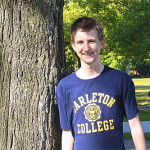Gershon Baskin met with a group of activists at Carleton College in Northfield, Minnesota. The activists came away with the feeling that Gershon was incredibly honest with them regarding the need for a two state solution between Israel and Palestine, in order to bring peace within the region.
Click here for more info about Gershon’s presentation: Israel Post-Elections: Is Israeli Palestinian Peace Still on the Table
https://gershonbaskin.org/events/israel-post-elections-is-israeli-palestinian-peace-still-on-the-table/
This spring break I decided to attend the national J Street conference in Washington DC. I certainly did not agree with everything that was said, but nonetheless I was incredibly grateful to have the opportunity to attend this conference. I was able to hear from many speakers who are involved in attempting to bring about peace in Israel and Palestine. They had many different panels throughout the weekend. Just as some examples, I went to one on internal Israeli politics, one on Palestinian grass root efforts for peace, another one on following the money (i.e. making sure powerful Jewish organizations are not funding settlement expansion.) Again, regardless of where one stands on this issue, I felt that getting to hear all of these speakers talk about these issues certainly helped me get a better grasp on the conflict. The J Street conference definitely seemed to be geared towards a Jewish audience (and I am not Jewish.) It seemed that many within this conference approached the issue of the occupation as it relates to Israel’s security and prosperity; arguing that it is strategically best for Israel to end the occupation. For me, it has always been about human rights-so seeing the issue approached from this perspective gave me something interesting and new to think about it. The first night they had two women who lived in Palestine and Israel respectively share their narratives (living in the area of conflict, yet still being good friends). Their stories were very powerful, and spoke of rockets and airstrikes hitting near both of their homes. I also really enjoyed hearing from Saeb Erekat, former chief negotiator within the PLO (Palestinian Liberation Organization). He gave an electric speech emphasizing that the Palestinians did indeed want peace, despite the all too common narrative, that Israel ‘does not have a partner to make peace.’ It was great attending this conference with a group of Carleton students that were equally interested in learning more about the conflict.
Despite the fact that I’m not sure if I align with J Street 100 percent, I’ve found that we both have the same end goal-ending the occupation. In getting involved with this particular group I’ve found that we as students can actually have somewhat of a role in doing what we can to further this cause.
One of J Street U’s main efforts comes in tracking the money which Jewish organizations give to various other organizations and causes. Some of these organizations refuse to publish their policies on their websites. When you look at some of these organization’s tax forms it appears that some are giving to organizations that use their money to perpetuate the occupation. J street is attempting to get these organizations to publish their policy, and to ensure that these organizations are not helping in perpetuating the occupation. This strategy has already worked in certain regions around the country, such as Portland! Our chapter in Minnesota is doing its best to set up meetings with people that could eventually help us to hold these federations accountable with regards to where they are donating.
Getting more involved in J Street has also given me valuable experience that I believe I can draw on for other things down the road. I’ve learned more about strategies of talking with people one on one (both about this issue and in general). I’ve also learned how to construct my own personal narrative-something that I’ve found particularly difficult to do in the past. At the conference, we were given the opportunity to meet with our representatives and senators in congress. One of my meetings only had four people in it, and I was the only student! I really enjoyed being given the opportunity to seriously speak about this issue to members of congress. It was also the first time I had ever been on capital hill, which was quite the interesting experience.
This term Carleton has also had several speakers come to talk about this issue. One event brought the co-founders of SHADES, a negotiation program run at Harvard which brings Israelis and Palestinians together training them to be better negotiators. It was fascinating to see the dynamic between the two cofounders. One had personally seen Israeli soldiers commit acts of violence against his family/friends and the other used to be a soldier in the Israeli army. Hearing about their relationship develop from fear of one another, to friends was truly inspiring. It was refreshing that they seemed to approach the talk very honestly-they admitted that they had areas of disagreement, but were still willing to work together for this common goal of achieving peace in Israel and Palestine.
I was also afforded the opportunity to meet with Gershon Baskin, an influential Israeli peace activist who seems to have talked with others who were heavily involved in Israeli-Palestinian negotiations. This was in a very small group setting affording me the chance to really get to talk with this person. I also got the sense that Gershon was being incredibly honest with us, which I really appreciated
. Regardless of one’s personal views I would really recommend going to J Street if you are interested in hearing about this conflict. Not every one agrees with everyone else; a range of view points is held within this campus organization. This diversity in viewpoints allows for interesting and challenging discussions, which I think can be very valuable even if one disagrees with them.


